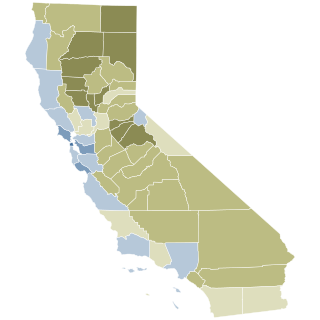
Municipalization is the transfer of private entities, assets, service providers, or corporations to public ownership by a municipality, including a city, county, or public utility district ownership. The transfer may be from private ownership or from other levels of government. It is the opposite of privatization and is different from nationalization. The term municipalization largely refers to the transfer of ownership of utilities from Investor Owned Utilities (IOUs) to public ownership, and operation, by local government whether that be at the city, county or state level. While this is most often applied to electricity it can also refer to solar energy, water, sewer, trash, natural gas or other services.

The California special election of 2005 was held on November 8, 2005 after being called by Governor Arnold Schwarzenegger on June 13, 2005.

Sempra is a North American public utility holding company based in San Diego, California. The company is one of the largest utility holding companies in the United States with nearly 40 million consumers. Sempra's focus is on electric and natural gas infrastructure and its operating companies include: Southern California Gas Company (SoCalGas) and San Diego Gas & Electric (SDG&E) in Southern California; Oncor Electric Delivery Company in Texas; and Sempra Infrastructure, with offices in California and Texas.
A Renewable Portfolio Standard (RPS) is a regulation that requires the increased production of energy from renewable energy sources, such as wind, solar, biomass, and geothermal, which have been adopted in 38 of 50 U.S. states and the District of Columbia. The United States federal RPS is called the Renewable Electricity Standard (RES). Several states have clean energy standards, which also allow for resources that do not produce emissions, such as large hydropower and nuclear power.

Community Choice Aggregation (CCA), also known as Community Choice Energy, municipal aggregation, governmental aggregation, electricity aggregation, and community aggregation, is an alternative to the investor-owned utility energy supply system in which local entities in the United States aggregate the buying power of individual customers within a defined jurisdiction in order to secure alternative energy supply contracts. The CCA chooses the power generation source on behalf of the consumers.

Proposition 4, or the Abortion Waiting Period and Parental Notification Initiative, also known to its supporters as Sarah's Law, was an initiative state constitutional amendment in the 2008 California general election.

The California state elections, November 2008 were held on November 4, 2008 throughout California. Among the elections taking place were those for the office of President of the United States, all the seats of California's delegation to the House of Representatives, all of the seats of the State Assembly, and all of the odd-numbered seats of the State Senate. Twelve propositions also appeared on the ballot. Numerous local elections also took place throughout the state.

California Proposition 6, also known as the Safe Neighborhoods Act and The Runner Initiative, is a statutory initiative that appeared on the November 2008 ballot in California. This proposition was rejected by voters on November 4 of that year.

California Proposition 5, or the Nonviolent Offender Rehabilitation Act was an initiated state statute that appeared as a ballot measure on the November 2008 ballot in California. It was disapproved by voters on November 4 of that year.

Proposition 11 of 2008 was a law enacted by California voters that placed the power to draw electoral boundaries for State Assembly and State Senate districts in a Citizens Redistricting Commission, as opposed to the State Legislature. To do this the Act amended both the Constitution of California and the Government Code. The law was proposed by means of the initiative process and was put to voters as part of the November 4, 2008 state elections. In 2010, voters passed Proposition 20 which extended the Citizen Redistricting Commission's power to draw electoral boundaries to include U.S. House seats as well.

California Proposition 10, also known as the California Alternative Fuels Initiative, was an unsuccessful initiated state statute that appeared on the November 2008 ballot in California. Proposition 10 was funded by Clean Energy Fuels Corp., a corporation owned by T. Boone Pickens. Clean Energy Fuels Corp. is the nation's leading operator of natural gas vehicle fueling stations.

Solar power has been growing rapidly in the U.S. state of California because of high insolation, community support, declining solar costs, and a renewable portfolio standard which requires that 60% of California's electricity come from renewable resources by 2030, with 100% by 2045. Much of this is expected to come from solar power via photovoltaic facilities or concentrated solar power facilities.

Proposition 23 was a California ballot proposition that was on the November 2, 2010 California statewide ballot. It was defeated by California voters during the statewide election by a 23% margin. If passed, it would have suspended AB 32, a law enacted in 2006, legally referred to its long name, the Global Warming Solutions Act of 2006. Sponsors of the initiative referred to their measure as the California Jobs Initiative while opponents called it the Dirty Energy Prop.

A California Congressional Redistricting Initiative, Proposition 20 was on the November 2, 2010 ballot in California. It was approved by 61.2% of voters. Election officials announced on May 5 that the proposition had collected sufficient signatures to qualify for the ballot. The measure is known by its supporters as the VOTERS FIRST Act for Congress.

Proposition 39 is a ballot initiative in the state of California that modifies the way out-of-state corporations calculate their income tax burdens. The proposition was approved by voters in the November 6 general election, with 61.1% voting in favor of it.

Proposition 34 was a California ballot measure that was decided by California voters at the statewide election on November 6, 2012. It sought to repeal Proposition 17, originally passed by voters in 1972, thus abolishing the death penalty in California.

Proposition 62 was a California ballot proposition on the November 8, 2016, ballot that would have repealed the death penalty and replaced it with life imprisonment and forced labor without possibility of parole. It would have applied retroactively to existing death sentences and increased the portion of life inmates' wages that may be applied to victim restitution.

Proposition 66 was a California ballot proposition on the November 8, 2016, ballot to change procedures governing California state court challenges to capital punishment in California, designate superior court for initial petitions, limit successive petitions, require appointed attorneys who take noncapital appeals to accept death penalty appeals, and exempt prison officials from existing regulation process for developing execution methods.
Arizona House Bill 2005 is state-level legislation introduced in the Arizona State Legislature and signed into law in 2018.
California produces more renewable energy than any other state in the United States except Texas. In 2018, California ranked first in the nation as a producer of electricity from solar, geothermal, and biomass resources and fourth in the nation in conventional hydroelectric power generation. As of 2017, over half of the electricity (52.7%) produced was from renewable sources.










